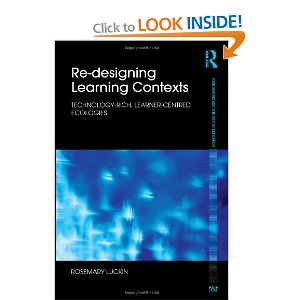The Education Hack this last weekend at the London Knowledge Lab were 2 of the most enjoyable days of my working life – the students, teachers, volunteers and film crew all worked together to develop great ideas into practical designs and prototypes. The students then presented their ideas on the main stage at the London Festival of Education and inspired and amazed the audience.I’ll post each idea over the next few days, but for now here is the trailer
Education Hack: Movie trailer of AAA* students building and hacking
November 19, 2012 — Prof. Rose LuckinEarth Hour 2012, Learning from our Teenagers to turn off the lights on Saturday
March 29, 2012 — Prof. Rose LuckinOne of the pleasures of my job is that we work with learners and teachers through participatory research and design. Recently we have been working with teenagers at several different schools as part of a research project exploring teenagers’ understanding of energy and their consumption of it. With a view to motivating their curiosity to understand more and to want to be thoughtful about their own consumption and that of their peers, families and communities. The nature of the participatory approach helps the learning to work in all directions, so we learn a great deal through the process, not just about the teenagers and their energy lives, but about things like Earth Hour 2012. One of our groups of young people have taken the initiative at their school and organised local events to prompt people to think on Earth Hour. I didn’t know about Earth Hour until they enlightened me, which is a lovely demonstration that teenagers are not just key consumers of energy, they are also key communicators and I wil now be turning off my lights for an hour at 8.30 pm on Saturday
We know that despite the fact that we hear a lot about energy sustainability in political and popular rhetoric, energy consumption is rising. Teenagers are certainly important consumers now and in the future and yet little is known of their conceptions about energy. There is growing evidence that they find it hard to translate their formal learning about energy into an understanding of their personal energy consumption. We need to know more about: What energy consumption is relevant to teenagers? Why do teenagers think energy is an issue? Where do teenagers learn about energy? What would motivate teenagers to learn about energy consumption? And to know if they are they concerned.
It has been fascinating to find out more about teenage culture through the photo diaries, focus groups, activities, questionnaires, and design work that we have completed.
And, there are clear ways in which technology can help, for example through:
- linking science learning into everyday life,
- motivating and supporting enquiry into personal energy consumption e.g. thorugh a mobile phone app,
- linking resources in teenagers’ personal contexts to support enquiry,
- and helping to communicate and activate their social networks about issues that spark their interest, such as Earth Hour
Still off my trolley? Reflections on technology to refresh the parts other forms of learning cannot reach
February 10, 2012 — Prof. Rose LuckinAfter a few days of contemplation I remain convinced about the potential of Augmented Reality to support learning, particularly when combined with a range of other technologies through mobile phones, and embedded devices, for example.
Our own research has demonstrated that AR has the potential to promote learning and to motivate children to engage with learning activities. There is evidence that specific skills can be improved, that learners are motivated and challenged through interactive problem solving activities and that AR can offer many opportunities for collaboration. Previous research projects, some of them quite old now, have also shown the potential of AR to enhance the presentation of knowledge across a range of real-world settings and the creation of engaging ways of interacting with simulations: demonstrating the broad potential of this technology across a spectrum of learning activities. See for example, Ambient Wood, Savannah, Environmental Detectives and there are more general lessons to be learned from studies with Ubiquitous. Augmented.Reality User Interfaces.
It is clear that to be effective, developers of AR for learning will need a rich skill set in order to create applications that offer the necessary learner control, challenging interactivity and experience coherence. As previously noted this seems like a perfect task for participatory design with young people being an integral part of designing their own current and future technology rich learning experiences.




